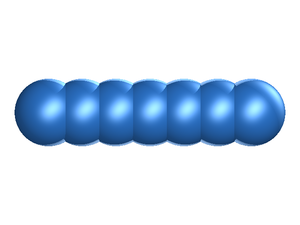Fused hard sphere chains: Difference between revisions
Jump to navigation
Jump to search
No edit summary |
No edit summary |
||
| Line 5: | Line 5: | ||
An effective number of monomers can be applied to the fused hard sphere chain model by using the relarion (Ref. 4 Eq. 2.18) | An effective number of monomers can be applied to the fused hard sphere chain model by using the relarion (Ref. 4 Eq. 2.18) | ||
:<math>m_{\rm effective} = \frac{[1+(m-1)L^*]^3}{[1+(m-1)L^*(3-L^{*2}/2 | :<math>m_{\rm effective} = \frac{[1+(m-1)L^*]^3}{[1+(m-1)L^*(3-L^{*2})/2]^2}</math> | ||
where ''m'' is the number of monomer units in the model, and <math>L^*=L/\sigma</math> is the reduced bond length. | where ''m'' is the number of monomer units in the model, and <math>L^*=L/\sigma</math> is the reduced bond length. | ||
| Line 11: | Line 11: | ||
The volume of the fused hard sphere chain is given by (Ref. 5 Eq. 13) | The volume of the fused hard sphere chain is given by (Ref. 5 Eq. 13) | ||
:<math>V_{\rm FHSC} =\frac{1}{6} \pi \sigma^3 \left( 1 + (m-1)L^* \left(3-L^{*2} | :<math>V_{\rm FHSC} =\frac{1}{6} \pi \sigma^3 \left( 1 + (m-1)\frac{L^* \left(3-L^{*2}\right)}{2} \right)</math> | ||
and the surface area is given by (Ref. 5 Eq. 12) | and the surface area is given by (Ref. 5 Eq. 12) | ||
Revision as of 10:28, 8 March 2011

In the fused hard sphere chain model the molecule is built up form a string of overlapping hard sphere sites, each of diameter .
An effective number of monomers can be applied to the fused hard sphere chain model by using the relarion (Ref. 4 Eq. 2.18)
where m is the number of monomer units in the model, and is the reduced bond length.
The volume of the fused hard sphere chain is given by (Ref. 5 Eq. 13)
and the surface area is given by (Ref. 5 Eq. 12)
Equation of state
The Vörtler and Nezbeda equation of state is given by
where
and
- Horst L. Vörtler and I. Nezbeda "Volume-explicit equation of state and excess volume of mixing of fused hard sphere fluids", Berichte der Bunsen-Gesellschaft 94 pp. 559- (1990)
- Saidu M. Waziri and Esam Z. Hamad "Volume-Explicit Equation of State for Fused Hard Sphere Chain Fluids", Industrial & Engineering Chemistry Research 47 pp. 9658-9662 (2008)
See also
References
- M. Whittle and A. J. Masters "Liquid crystal formation in a system of fused hard spheres", Molecular Physics 72 pp. 247-265 (1991)
- Carl McBride, Carlos Vega, and Luis G. MacDowell "Isotropic-nematic phase transition: Influence of intramolecular flexibility using a fused hard sphere model" Physical Review E 64 011703 (2001)
- Carl McBride and Carlos Vega "A Monte Carlo study of the influence of molecular flexibility on the phase diagram of a fused hard sphere model", Journal of Chemical Physics 117 pp. 10370-10379 (2002)
- Yaoqi Zhou, Carol K. Hall and George Stell "Thermodynamic perturbation theory for fused hard-sphere and hard-disk chain fluids", Journal of Chemical Physics 103 pp. 2688-2695 (1995)
- T. Boublík, C. Vega, and M. Diaz-Peña "Equation of state of chain molecules", Journal of Chemical Physics 93 pp. pp. 730-736 (1990)
- Antoine Chamoux and Aurelien Perera "On the linear hard sphere chain fluids", Molecular Physics '93 pp. 649-661 (1998)

![{\displaystyle m_{\rm {effective}}={\frac {[1+(m-1)L^{*}]^{3}}{[1+(m-1)L^{*}(3-L^{*2})/2]^{2}}}}](https://wikimedia.org/api/rest_v1/media/math/render/svg/87c971dcd843e41062d341bfbcd501f4edea8001)



![{\displaystyle Z_{\mathrm {FHSC} }=1+(1+3\alpha )\eta _{0}(P^{*})+C_{\rm {FHSC}}[\eta _{0}(P^{*})]^{1.83}}](https://wikimedia.org/api/rest_v1/media/math/render/svg/91afdc922fdfa04c21cdd02b43bebbdcfee850a4)
![{\displaystyle C_{\rm {FHSC}}=5.66\alpha (1-0.045[\alpha -1]^{1/2}\eta _{0})}](https://wikimedia.org/api/rest_v1/media/math/render/svg/4149ca3dad157caa5ae90ae3f5937fe4ef96457e)
